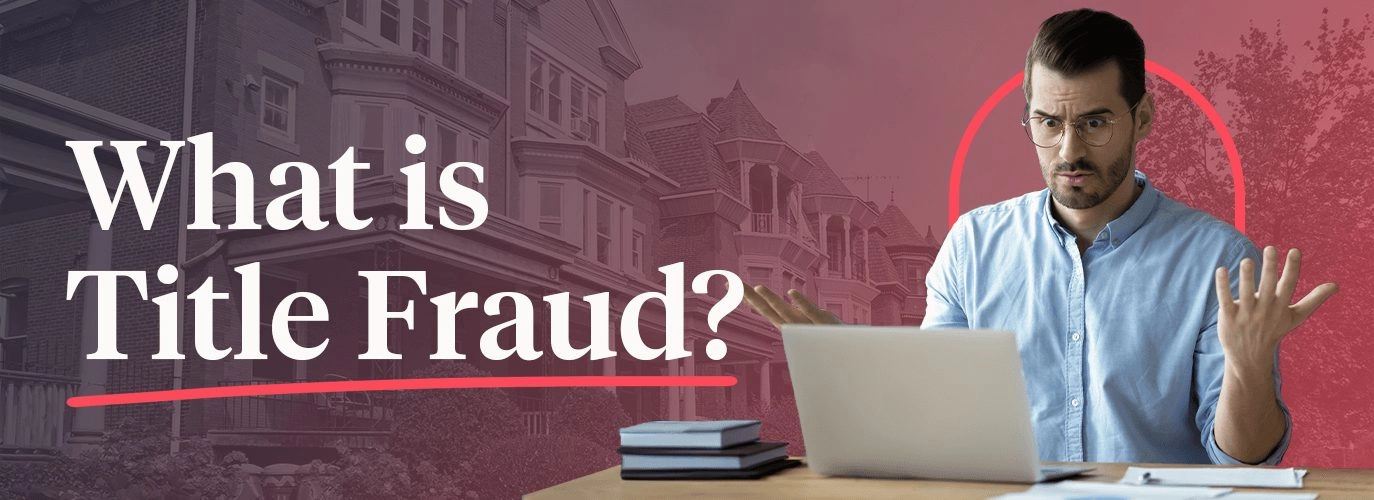The thrill of buying a new home can quickly turn into a nightmare if you fall victim to real estate title fraud. This crime involves criminals illegally transferring ownership of a property without the rightful owner’s knowledge.
What is Title Fraud?
Real estate title fraud, also known as deed fraud or home title theft, is essentially someone stealing the legal ownership of a property without the rightful owner’s knowledge or consent.
Imagine this scenario: You close on your dream home, finally settling into the reality of home ownership. Months later, your world is turned upside down: somehow, someone else owns the property. This is the devastating reality of title theft.
Here’s a breakdown of how it works in simpler terms:
- A deed is like a car’s pink slip – it proves who legally owns the property.
- In title fraud, criminals try to steal or manipulate the deed to make it seem like they own the property.
- They might forge documents, impersonate the real owner, or exploit weaknesses in public records.
- Once they have a fake deed, they try to sell the property, take out loans against it (home equity lines of credit or HELOC), or simply leave you with a huge legal mess.
What are the Different Types of Title Fraud (Deed Fraud)?
Title fraud encompasses various deceptive practices aimed at manipulating property ownership records. Here are some of the different types of title fraud:
- Forgery: This type of fraud involves the forging of signatures on property documents, such as deeds or mortgage papers, to transfer ownership illegally.
- Impersonation: In impersonation fraud, an individual pretends to be the rightful owner of a property and sells or mortgages it without the owner’s knowledge or consent.
- False Documents: Fraudsters may create counterfeit documents, such as deeds, to make it appear as though they have legal ownership of a property.
- Identity Theft: Identity theft occurs when someone steals another person’s personal information and uses it to fraudulently transfer property ownership or obtain mortgages.
- Straw Buyer Scheme: In this scheme, a straw buyer, often someone with good credit, is used to purchase a property on behalf of a fraudster who cannot qualify for a mortgage. Once the transaction is complete, the fraudster takes control of the property and then defaults on the mortgage. This primarily hurts the banks but can kill a transaction if discovered before closing.
Understanding these different types of title fraud is essential for property owners and buyers to protect themselves from falling victim to fraudulent schemes. Partnering with reputable title professionals like Empora can help mitigate the risks of title fraud and ensure secure real estate transactions.
11 Warning Signs of Title Fraud (Red Flags to Watch Out For)
Buying a home is an exciting time, but it’s also crucial to be aware of potential risks. To protect yourself, you need to be on the lookout for warning signs. Here are some red flags that could signal potential title fraud:
- Unusually Rushed Closing Process: A legitimate real estate transaction takes time. If the seller or agent pressures you to close quickly, especially within a few days or weeks, it’s a major red flag. This could be an attempt to get you to sign paperwork before you have a chance to properly review it or raise questions.
- Pressure to Use a Specific Closing Agent or Title Company: You have the right to choose your own title company and closing agent. If the seller or agent insists on using a specific company, especially one they haven’t worked with before, be cautious. They may be working with a fraudulent company that will expedite the closing process without proper checks.
- Inconsistencies in Paperwork or Property Details: Carefully review all documents you receive, including the purchase agreement, title report, and closing documents. Look for any inconsistencies, such as misspellings, incorrect addresses, or discrepancies in property details like square footage or number of bedrooms. These inconsistencies could be signs of forged documents or attempts to mislead you.
- Unfamiliar Wiring Instructions for Closing Funds: Never wire closing funds to an unfamiliar account or overseas location. Legitimate closings involve wiring funds to a reputable title company or escrow account. If the seller or agent requests anything different, stop the transaction immediately.
- Difficulty Contacting the Seller or Real Estate Agent: If you have trouble reaching the seller or agent, especially when you have questions or concerns, it’s a red flag. Legitimate sellers and agents will be readily available to answer your questions and address any issues.
- Discrepancies in Property Documents: Pay close attention to any inconsistencies or discrepancies in the property documents, such as incorrect ownership details, forged signatures, or missing information. These irregularities could indicate tampering or fraud.
- Unfamiliar or Last-Minute Changes: Watch out for unexpected changes in the transaction details, such as sudden alterations to the purchase price, closing date, or payment instructions. Fraudsters may introduce last-minute changes to exploit vulnerabilities in the process.
- Difficulty Verifying Information: It could be a warning sign if you encounter difficulty verifying information about the property or the parties involved in the transaction. Fraudsters may create obstacles to prevent you from conducting thorough due diligence.
- Lack of Communication or Availability: If you experience difficulties contacting the seller, real estate agent, or other parties involved in the transaction, it could raise suspicions. Fraudsters may avoid communication to evade detection or to conceal their activities.
- Title or Ownership Issues: Any indications of title defects, unresolved liens, or disputed ownership claims should be thoroughly investigated. These issues could be exploited by fraudsters to perpetrate title fraud.
- A Purchase Price That is Too Good To Be True: Combined with the pressure to act fast, a low purchase price gets you to take your eyes off important details and rush to close.
If you notice any of these red flags, don’t hesitate to pause the transaction and seek professional help from a lawyer or a reputable title company like Empora Title. Their expertise can help you verify the legitimacy of the transaction and protect your investment.
How to Protect Yourself From Home Title Fraud
Title companies are your first line of defense when it comes to title fraud. Keep reading to learn more about how a title company can protect you and your home from title fraud.
Unveiling the Past: Title Search and Verification
Imagine buying a car without checking its history. That’s essentially what happens without a proper title search. Title companies investigate the property’s ownership history. This involves:
- Examining Public Records: We delve deep into county records, tax documents, and other official sources to verify the true owner and identify any outstanding liens, judgments, or easements on the property.
- Unveiling Hidden Claims: Our experts have a keen eye for uncovering potential issues, such as claims from unknown heirs, unpaid taxes, or fraudulent mortgages.
- Ensuring Clear Ownership: By meticulously piecing together the ownership history, we ensure you’re purchasing the property free and clear of any hidden claims.
Title Insurance: Your Safety Net
Even the most thorough title search can’t guarantee unforeseen issues that may arise later. That’s where title insurance comes in. It acts as a safety net, protecting you financially from:
- Hidden Defects in Title: If a previous owner unknowingly forged documents or had outstanding debts tied to the property, title insurance covers the legal costs and potential losses you might incur.
- Fraudulent Claims: In the unfortunate event of someone contesting your ownership due to title fraud, title insurance provides legal defense and financial compensation for damages.
- Peace of Mind: Knowing you have this valuable protection allows you to relax and focus on the joy of settling into your new home.
Monitor Your Credit Reports
Regularly checking your credit reports (you can get a free report from each of the three major bureaus annually) is another way to detect signs of identity theft that could be used to commit title fraud. Criminals might try to open new lines of credit in your name using the stolen property as collateral. By monitoring your credit report, you can identify any unauthorized activity and take steps to address it quickly.
What to Do If You Think You’re a Victim of Title Fraud
If you discover a discrepancy in your home’s ownership or suspect your title is stolen, take immediate action to protect your investment. Here are the crucial steps you should take:
- Act Fast: Time is critical. Contact a real estate attorney immediately to discuss your options.
- Report the Crime: File a police report and notify the Federal Trade Commission (FTC).
- Freeze Your Credit: Contact the three major credit bureaus (Equifax, Experian, and TransUnion) to freeze your credit report and prevent further fraudulent activity.
- Seek Legal Assistance: Consult with a lawyer experienced in real estate law to understand your rights and legal options.
- Gather Evidence: Collect any documents related to the property purchase, including the deed, closing documents, and any communication with the fraudulent parties.
- File a Title Claim: If you have title insurance, contact your provider to understand your coverage and next steps.
- Don’t Give Up: The process can be lengthy, but with the right guidance, you can fight to reclaim your property ownership.
Empowering You with Expertise
At Empora Title, we go beyond just being service provider. We believe in empowering our clients with knowledge. Our team of experienced title professionals is here to guide you through every step of your transaction.
By combining a comprehensive title search, robust title insurance, and our team’s unwavering dedication, Empora Title creates a secure foundation for your real estate transaction. Don’t settle for anything less than complete peace of mind. Contact us today and let us safeguard your dream home from the dangers of title fraud.


